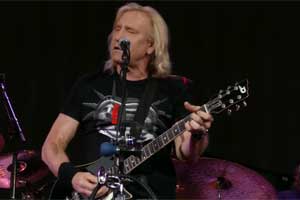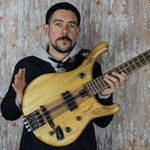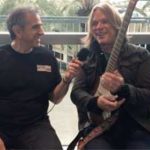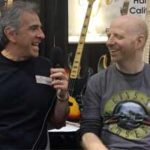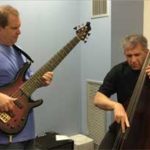Joe Walsh is keeping Bad Company this summer, has plenty of good work planned ahead
By Gary Graff
May 20, 2016
Back in the late ‘70s, Joe Walsh declared that “life’s been good to me so far,” and you won’t find him saying anything different now.
And why should he? Walsh’s charmed musical life has included membership in the James Gang and a Rock and Roll Hall of Fame induction with the Eagles, as well as a potent solo career that started in 1972 with his band Barnstorm and has continued alongside everything else, right up through 2012’s “Analog Man” and his current tour with Bad Company.
That’s on top of a slew of other work that includes a wide range of gun-for-hire sessions for Foo Fighters, Don Henley, Steve Winwood, Bob Seger, Michael McDonald, Kix Brooks, Lionel Richie, Wilson Phillips and more (did we say range?) as well as producing Dan Fogelberg’s 1974 album Souvenirs. Walsh was also part of brother-in-law Ringo Starr’s second All-Starr Band and has played on his albums as well.
Life’s indeed been good for Walsh, and he was not surprisingly in good spirits — though he declined to talk about Glenn Frey’s death and the end of the Eagles for now — when he sat down to chat with us just before hitting the road with Bad Company.
FGPO: You and Bad Company on the road together — that’s a potent combination. How did it happen?
Walsh: So far it’s a hoot. I was looking for some way to not do just another tour for the summer. I wanted to take it up a notch, and I thought it would be great to hook up with somebody who was compatible. So we looked around, and I got word that Bad Company was going to tour, too. Paul (Rodgers) and I talked; we’re old friends, and we agreed that it would be a really good show and that we would be mightier together than either of us individually. So we decided to hook up, and the agreement was nobody’s opening. We drew straws about who plays first and split that up, let go of our egos and it all worked out good. It’s a great evening.
FGPO: Did you guys intersect much in the past, especially during the 70s?
Walsh: Yeah, we played shows together and bumped into each other on the road and got a chance to hang out as friends. I think I was talking about considering joining them for awhile; it never went anywhere, but we’ve been friends forever. I think Simon (Kirke) and I went hellraising a couple of times, and Paul’s great company. He’s a great guy to be with. We would pretty much hang out and sing oldies. That was a favorite thing we would do; We would get an acoustic guitar and pass it around and sit in a circle and sing obscure oldies and try to figure out the B-side and all of that.
FGPO: So when Mick Ralphs decided not to do the tour, did they come to you at all about filling in?
Walsh: Yeah, we had some dialogue, but we just compared notes. I was booked solid with commitments and stuff and it just wouldn’t work. I did do some recording with Paul about eight years ago; we have some basement tapes that we’re gonna revisit. We just got together and wrote for a couple days and recorded it. A couple really good things came out of that so we’re gonna revisit it.
FGPO: That’s pretty exciting. What was that collaboration like?
Walsh: I had some funky licks that had progressed into kind of a song form, and that’s what Paul loves. So I dumped those on him, and he put words to it and sang it, and, of course, it’s brilliant. It’s an approach I never would’ve come up with. And then he had a couple song ideas, melodies, word groups that he gave to me, and I’ve been working on those. So we’re gonna get back and compare notes. He’s wonderful to co-write with; besides being a great singer he’s a great musician, he really is. He knows how to work a band. He can be in the studio and give direction to the musicians, and it’s all really good stuff.
FGPO: Your last album was called Analog Man. What’s it like being an analog guy in such a digital age?
Walsh: You have to make some adjustments. I have found that technology can really affect the music, if you let it. The biggest temptation is now you can fix anything, and you can make it perfect. If something’s blatantly wrong or annoying with a performance, it’s okay to fix that, but the temptation is to fix a lot of things that don’t need fixing. You can end up taking all the mojo out of a human performance. When it’s perfect, it doesn’t have any soul to it. So I try to think analog and go for a human performance that has magic in it. And, as tempting as it is, I try to leave it alone. The virtual world that we’re all spending more and more time in doesn’t exist, really, and meanwhile our bodies are in chairs waiting for our brains to come back. We’re in there a lot; it’s easy to get lost. These are all observations, not a judgment, and I thought it would be good to embed them all into an album, being that my last album was totally analog.
FGPO: Is that something you’ve observed in live performance, too, these days?
Walsh: I just noticed it in recording. The old analog was so transparent, all you did was capture a performance. But with the digital end of it, there’s so much more you can do, which is great, I guess. It’s really fun to be able to fix everything. I’m enjoying it. I had to learn all the digital technology as much as I could. But I don’t know where it’s going yet, so I’m just a little leery of it. I know it ate the music industry infrastructure, I know that it ate intellectual property, and to some degree it ate radio, and I’m just not 100% for it until I see what else it eats. I hope it doesn’t eat me.
FGPO: You have a new song, “No Man’s Land,” on the soundtrack to the documentary Citizen Soldier. What’s the story there?
Walsh: I became aware of (the film) and jumped on board, because I really feel it’s important. It’s basically about an Oklahoma National Guard unit that out of nowhere got called up for active duty in Afghanistan, and they were behind enemy lines and, believe me, they were put in harm’s way. And, excuse me, but they kicked ass, and not all of them came back. But they took GoPros, and a friend of mine who does documentaries contacted them and wanted to tell their story. So this is a documentary about the ongoing war that we all have forgotten about, and it’s about a day in the life of these guys, and it’s compelling and it’s emotionally disturbing. My hope is it will bring awareness that we ARE at war, and there is a war going on even though the media ignores it, and none of the candidates are addressing foreign policy, period. But we’re fighting a war and every day kids are getting blown up and coming home destroyed. And if you see this documentary, it’s a slap in the face wake-up call, so I’m on board. I think (the song) will be controversial, but I really believe in this documentary. My conscience dictates that I do something for the vets that are coming back, ’cause they need help.
FGPO: Four decades along, what are your audiences like now?
Walsh: The people that have been with me for the whole journey, most of ’em live in the woods, I guess. But there’s a whole new generation of kids, I guess because their parents played my music when they were growin’ up, but they’re coming to see me for the first time, and they’re kind of curious, “What is this guy?” Not “Who?,” “What in the world is this guy? Let’s go see.” I’ve got grandparents down to 10-year-old kids with their grandparents. I can really feel the new energy, and I’ve got to bear in mind that a little section of the audience is coming to see me for the first time. I can’t look at my songs like, “Oh God, I’ve got to play all these songs again.” I’ve got to perform it differently with the new crowd. But it’s great energy, I’m grateful for the longevity. I like to say that in my audience there’s one of everything.
FGPO: What’s your tour rider like today compared to 20 years ago?
Walsh: Just that the alcohol’s not on it — got rid of a couple of pages. (laughs)
FGPO: So how did you have your fun these days?
Walsh: What’s left for me now, sober for 22 years, is to play guitar and practice and work at my craft. It’s full circle, and it’s been an incredible journey. I have a great life. I have a great family. I’m really blessed, because I’ve been through stuff a lot of musicians never get to experience — and I’m not done yet.
FGPO: Back when you started, could you envision being here all these years later, still doing it?
Walsh: No. I didn’t know where it was going to go. When I started off I was really happy — I had one guitar and I made enough money to pay my rent, and I practiced all day and then went downtown to play. Life was so simple, and I was just working at my craft, y’know? And then I had a couple different degrees of success, and a lot of stuff comes with success that you don’t think about, and a lot of it’s non-musical and a lot of it can be very distracting. And then I started partying and went through that. That happens to everybody and some of us flame out and crash and burn and some of us make it through — a lot more crash and burn than make it through. But here I am now, but I never thought about the future. I never thought I’d get here.
FGPO: You’re going to have a hell of a book.
Walsh: It’ll be out next year, and that’s gonna be a really good book. I thought I could make more money by people paying me NOT to be in my book than I actually could putting the book out (laughs). But I decided to go ahead and write it, and I’m really happy now. A lot of people are nervous, but I’m not gonna hurt anybody.
